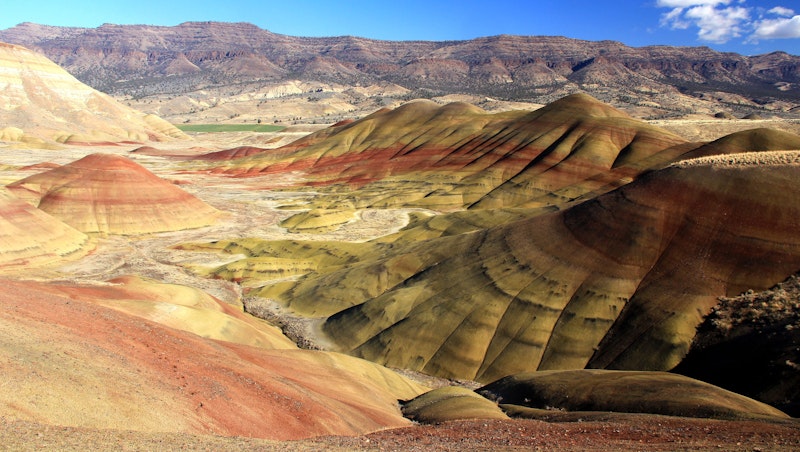We’d cancelled a visit to Washington DC scheduled for June 2020 due to Covid. Whatever beliefs one holds about the Wuhan, its origins and political usages, the virus did shut things down. Alaska Airlines first balked at a refund, offering future air miles, but soon they internalized the import of the pandemic and gave us our money back. We went to the beach instead. With the summer of 2021 waning, I had to get out of Dodge for a few days, Dodge being Portland. Business was way off for our self-employment gigs, so it had to be reasonable.
I opted for a remote place I’d visited, known, and loved before, a cabin at Sarvice Corral, 20 miles out of Fossil, Oregon. Fossil is the gateway to the John Day Fossil Unit, a region where dinosaurs left caches of their dominion everywhere, and demarcation signs along the highways all include the phrase, “Journey Through Time.”
I called the Sarvice proprietress, Judy, a widow who lives in a farmhouse across Highway 218 from the cabins. She told me that Wheeler County had ordered her to shut the place down at the height of the pandemic, but that she’d recently been allowed to take bookings again. I reserved three days, two nights, for the third week of August.
After a four-hour drive, which included a stop for lunch in Fossil—the grocery store was the only thing open so Sue and I stocked up—we pulled up at the sun-desiccated corral that marks the entrance to the tree-shaded collection of rustic cabins. I immediately noticed that unlike on my prior visits, there were no vehicles parked outside any of the cabins.
As we were unpacking into our cabin, the best of the bunch for $65 a night, Judy rolled up the dirt road from the highway on her quad.
“Looks like you’re going to have the place all to yourselves,” she said.
It had been slow coming back since the shutdown. Sarvice is within an hour of one of the eight wonders of Oregon’s world, the Painted Hills National Monument, and nearby to other prehistoric attractions. On past visits, it had been typical to see vacationers in every unit.
That first night we got sauced. It was hot, well above 90, not unusual for this arid, red-soiled country in mid-summer. While Sue made dinner in an open-air kitchen with completely empty community refrigerators, I strolled the compound shirtless, playing my guitar. We laughed at the middle-of-nowhere exclusivity granted us, feeling like wealthy hillbillies. Sundown approached, and the surrounding granite bluffs and plateaus took on a pink hue. Unlike the conflagrations that swept large swaths of countryside in 2020, there were no major fires in Central Oregon in 2021—vistas near and far were crystal-clear.
At full dark and sobering up, Sue expressed concern about the 500-foot distance between our cabin and the community bathroom. I was enjoying myself perhaps too much—I told her that if a cougar came out of the Ponderosa pine forest and snatched her away, I’d probably sleep right through it.
The next morning, we visited the Painted Hills, windswept and silent on a Wednesday. I’d seen them before, Sue hadn’t. As a world traveler she admitted: the multicolored layers of geologic history are a world class natural wonder.
We carved up a steak and had stir fry Wednesday night, feeling like Appalachian Kennedys in our private compound. Strolling over to the wood-sided meeting house, we looked in at the long table and empty chairs. A notice taped to the front door read: Welcome St. Charles Medical Group Retreat: 2019. As the sun fell, I shot baskets alone on the half-court.
Back in a civilization miles distant, a virus was working against the human species. Whatever conclusions one has reached about the pandemic, millions had died, and more still would die. As we finished off the remaining beer and wine in the fridge, I thought about how, politically, socially, and culturally, our species was working overtime against itself.
At bedtime clouds rolled in and obscured a waning moon. On a vigilant walk to the bathroom at three a.m. I noticed that the night sky was clear again, and the moon was down, and the stars winked as they had in the time when dinosaurs walked the earth.
I didn’t want to go home.
—Mark Ellis is the author of A Death on the Horizon, a novel about political intrigue and cultural upheaval.

